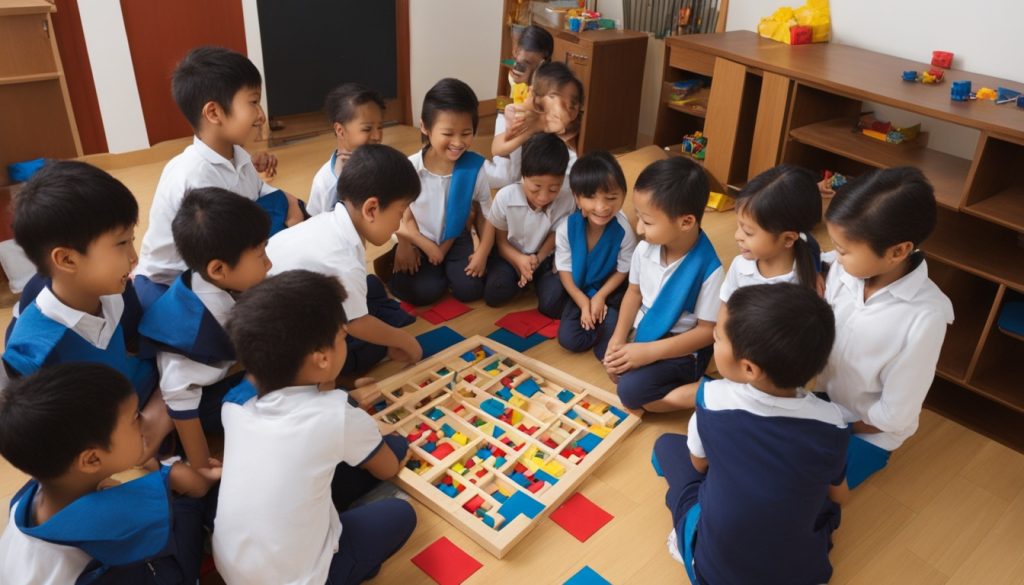Have you ever felt caught between teaching your child discipline and keeping a loving environment? Setting boundaries is a key act of love as a parent. These moments shape your child’s character. You might recall the lessons from your own childhood, thanks to consistent boundaries.
Studies show that good parenting includes three key things: a strong relationship, teaching good behaviors, and clear boundaries. It’s not about being strict, but creating a steady place for your child to grow. The importance of setting boundaries is huge; it helps kids learn patience, solve problems, and control themselves.
Key Takeaways
- Setting clear boundaries reduces anxiety and confusion in kids, boosting their self-esteem, empathy, and moral compass.
- Clear boundaries help kids develop self-control, impulse control, and social skills.
- Boundaries are key in teaching kids respect, self-regulation, and confidence.
- Getting kids involved in setting boundaries through family meetings is a good approach.
- Avoid labeling kids as “good” or “bad” is important for their development.
Michigan State University Extension and the Nurturing Parenting Community Based Education Program highlight the value of clear, positive expectations and giving kids choices. This helps them make decisions. It also prevents problems and sets clear rules for behavior, which is key for kids to grow well.
Try adding these discipline strategies to your daily life. Doing so helps you and your child communicate better, supporting their growth and building trust and respect between you.
Remember, setting boundaries is about giving your child the tools they need to face life. When they use the compass you’ve given them, you see the true value of parenting. Embrace the journey, and watch your child thrive in the safe space you’ve created.
Why Setting Boundaries is Crucial for Child Development
Setting boundaries is key in Positive Parenting. It helps kids grow and learn important things like confidence, social skills, and respect for others.

Building Emotional Intelligence in Children
Boundaries help kids feel safe and less anxious. They make life predictable, which is good for their mental health. This helps kids understand their feelings and how to get along with others.
Clear rules teach kids about sharing and respecting others. They learn what is okay and what’s not. This is important for their emotional growth.
Building Self-Esteem in Children
Boundaries are important for Fostering Child Independence. They create a safe space where kids can try new things. This helps them feel confident and ready for different social situations.
They learn the difference between discipline and punishment. This makes them feel safe and respected. It’s key in authoritative parenting.
Setting boundaries early on gives kids a strong base. They learn to rely on these rules as they grow. This prepares them for challenges in life, helping them do well in many situations.
Positive Parenting Techniques for Setting Boundaries
Positive parenting teaches children right and wrong within clear limits. This method boosts Child Social Skills Development and strengthens the bond between parents and kids. Studies prove that kids do best with limits set with care, building Family Respect and Empathy. Setting these boundaries is crucial for a Growth Mindset in kids.

Consistency is Key
Being consistent with boundaries is crucial for their success. By always sticking to the rules, kids learn to respect those limits. Kids who grow up with clear rules often find it hard to control their anger and make good judgments. This shows the importance of consistent, caring parenting.
This kind of parenting helps kids learn for life, making them better at making choices as they get older.
Clear and Positive Communication
Talking clearly and positively when setting limits is key. Explaining why each limit is important helps kids behave better. Giving kids choices within limits makes them feel more in charge and responsible. Talking about tough topics openly with your child is also important, as explained here.
This table shows how well different positive parenting methods work:
| Technique | Effectiveness (%) |
|---|---|
| Empathic Limit-Setting | 80 |
| Clear Communication | 85 |
| Consistent Rules | 90 |
| Collaborative Consequences | 75 |
Setting Boundaries with Kids: Practical Examples
Setting boundaries with children helps them grow and behave better. This part talks about setting limits at mealtime and bedtime. These times are key for kids’ health and learning to sleep well.

Mealtime Behavior
It’s important to have rules at mealtime. This teaches kids to be thankful and eat well. One good rule is to make them sit at the table during meals.
This helps them be polite and join in family talks.
- Personal Space: Teach kids to respect each other’s space at the table. This helps with physical contact.
- Healthy Eating Habits: Show them the value of eating well and trying new foods. This supports their health and growth.
Bedtime Routines
Having a bedtime routine is key for kids’ sleep. Sticking to these routines helps them relax and sleep well. This is important for their health and feelings.
- Set Time Limits: Set limits on screen time before bed. This helps keep their sleep quality good.
- Relaxation Techniques: Encourage reading or exercises to help them get ready for sleep.
Using these examples of meal and bedtime rules helps your kids. These rules support good behavior and health. They also show how important sleep is for kids.
Parent-Child Communication for Asserting Boundaries
Talking well with your child is key to setting boundaries. It’s important to understand their unique child learning styles. This helps create a respectful and understanding home. By listening well and setting clear rules, you make setting boundaries easier.

Active Listening
Listening well is vital for a strong bond with your child. It means paying full attention to what they say, feeling what they feel, and answering them. This makes them feel seen and heard, which is good for your relationship.
When you listen actively, keep eye contact, be patient, and don’t cut off your child. This approach helps you understand their needs and feelings. It also makes them feel important, which is good for learning and growing together.
Setting Clear Expectations
Clear rules help avoid confusion and set a standard for behavior. Start by explaining why each rule is important, like for safety or respect. Talk about what’s expected before you do something new, like “We keep our voices down in the library because it’s a shared space,” or “We finish homework before screen time starts.”
Being empathetic and setting consequences can make discipline work better. Open talks and fair consequences teach responsibility without making your child too upset. Here’s how setting boundaries affects parenting:
| Benefits | Details |
|---|---|
| Less Conflict | Improved communication between parents and children reduces misunderstandings. |
| Decreased Stress | Parents experience less stress knowing that clear expectations are set and followed. |
| Higher Compliance | Children adhere more willingly to boundaries when the purpose is clearly explained, indicating a potentially higher compliance rate. |
| Enhanced Learning | Consistent and fair consequences provide valuable learning experiences, fostering responsibility. |
| Effective Discipline | Balancing empathy with consequences leads to a more effective approach to discipline. |
Using these tips, you can handle parenting in the digital age well. This ensures a balanced and peaceful family life.
The Role of Boundaries in Teaching Kids Responsibility
Research shows that kids do better when they have clear, loving boundaries at home. Setting rules helps teach them responsibility. It makes them understand they must do their part, like chores or taking care of things.
Boundaries help teach kids manners and boost their creativity. They learn to focus better on their tasks, like homework or chores. This lets them be creative in a safe space.
Boundaries also help build resilience in kids. They learn to respect limits and see how their actions affect others. For example, following rules about screen time or bedtime teaches them discipline and self-control.
Boundaries are key to teaching kids about money too. Setting spending limits and encouraging saving teaches them to manage money well. Rules about chores and allowances teach them how actions lead to results.
Parents should set clear rules at home, like obeying, being respectful, and doing tasks. If kids misbehave, they might lose privileges or get stricter rules. This teaches them to respect authority and be responsible.
Managing Screen Time Through Effective Boundaries
Managing screen time is a big challenge for parents today. The American Academy of Pediatrics suggests that kids under 18 months should not watch TV, except for video chats. Kids from 18 to 24 months should watch high-quality shows, but not alone. For kids 2 to 5, limit screen time to one hour a day of good shows.
It’s important to set clear rules for screen use. Make tech-free zones like during meals and an hour before bed. Managing Child Tantrums over screen time means sticking to the rules.
- Set consistent daily or weekly screen time limits, making sure kids get why these limits are important.
- Encourage unplugged, unstructured playtime to balance screen time.
- Lead by example in how you use technology to set a good example for your kids.
Using technology wisely is key in Positive Reinforcement Parenting. Apps that control device time can help keep screen time in check. Keep screens out of bedrooms and charge devices elsewhere at night.
Teaching kids about safe online behavior and critical thinking is crucial in Parenting and Raising Kids. Watch what they do online, especially with older kids, to keep them safe and teach them about digital safety.
| Age Group | Recommended Screen Time |
|---|---|
| Avoid media use, except for video chatting | |
| 18 – 24 months | High-quality digital media exposure; avoid solo media use |
| 2 – 5 years | Limit to one hour per day of high-quality programming |
| 6 – 12 years | Consistent screen time limits with a mix of unplugged activities |
| Teenagers | Regular monitoring; encourage critical thinking about online content |
Being consistent with screen time limits helps kids adjust in one to two weeks, even if they resist at first. Handling Managing Child Tantrums and teaching them about these rules leads to better screen habits for everyone.
Challenges in Setting Boundaries and How to Overcome Them
Setting boundaries with your kids can be hard. Kids often resist, which is normal. It’s key to be patient and understanding to balance work and family life well.
Handling Resistance from Children
Kids test limits as they grow. When they resist, stay calm and firm. Family traditions and rituals help make these boundaries clear. For example:
- Explain the boundaries: Make sure your kids know why these rules exist. Talk to them in a positive way.
- Involve them: Let your kids help set some rules. They’ll be more likely to follow them.
- Consistency is key: Always stick to the rules, even if they complain.
Sibling rivalry can make it harder, but it’s a chance to teach them to work together and respect each other.
Coping with Setbacks
Setbacks happen, so stay patient and kind. Talk to your kids about tough topics. Explain their feelings but keep the boundaries clear. Here are some tips:
- Gentle reminders: Remind them about the rules and why they’re important.
- Allow consequences: Let them see the effects of breaking rules to learn their value.
- Reevaluate and adjust: Change boundaries as needed as your family grows and changes.
Managing work and family life is hard, especially with different parenting views or little family help. These challenges help in raising kids who are responsible and well-adjusted.
Parenting and Raising Kids: The Foundation of Setting Boundaries
Parenting is about making a safe and caring place for kids to grow. Setting boundaries is key, helping them feel secure and learn respect for others. With over 20 years of experience and a PhD in clinical psychology, I know how crucial this is.
Trust and love are the basics of a strong parent-child bond. Being consistent in discipline teaches kids how actions affect outcomes. This builds accountability and respect.
Encouraging hobbies and outdoor play helps kids develop social skills and stay healthy. Books like “No Drama Discipline” and “Parenting with Love and Logic” give great tips on setting loving boundaries.
Experts say 82% of parents value love, open talk, and respect in raising kids. A mix of warmth and clear rules works best for 38% of parents. This approach helps kids learn responsibility without being too strict.
Being active in your child’s life and letting them follow their interests is key. This makes them well-rounded and kind. Authors like Dr. Henry Cloud highlight how boundaries bring order and help kids grow into adults.
Active parenting uses strategies that match your child’s growth. Joining parenting groups gives you support and new ideas to tackle challenges together.
FAQ
Why is setting boundaries important in parenting?
How do boundaries contribute to building emotional intelligence in children?
What are some effective positive parenting techniques for setting boundaries?
Can you provide practical examples of boundaries for kids?
How does active listening aid in parent-child communication for setting boundaries?
What role do boundaries play in teaching kids responsibility?
How can parents effectively manage screen time for children?
How should parents handle resistance from children when setting boundaries?
What is the foundation of parenting concerning setting boundaries?
This post contains affiliate links. If you click on a link and make a purchase, I may earn a small commission — at no extra cost to you. Thank you for supporting this blog and helping me keep the patterns free! Read the full Affiliate Disclosure & Transparency.
